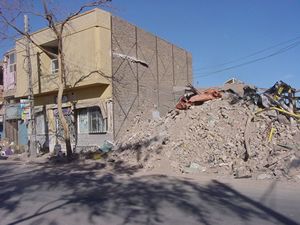 UN-Habitat announced on Thursday that it is expanding its ties with the academic world in the area of urban risk reduction and rehabilitation so that a new generation of graduates undertaking field work in disaster zones around the world are better groomed in integrated urban crisis-based practice. UN-Habitat announced on Thursday that it is expanding its ties with the academic world in the area of urban risk reduction and rehabilitation so that a new generation of graduates undertaking field work in disaster zones around the world are better groomed in integrated urban crisis-based practice.
“We are now building on past initiatives linking UN-Habitat policy and practice to academia,” said Mr. Dan Lewis, Chief of Urban Risk Reduction at the agency. “The outputs are noticeable.”
In 2011, for example, he said a team began with lectures and theses review with students in the Faculties of Design and Architecture at Chalmers University in Gothenborg, Sweden. The result was that a team of students visited Kenya in mid-year to test options for more efficient design of housing and temporary settlements for displaced populations. In turn, they provided support to UN-Habitat as well as UNHCR and UNICEF planning in Kenya.
In September, UN-Habitat teamed up with the University of Auckland, New Zealand leading to an invitation to a broader dialogue with representatives from universities throughout the Pacific Rim countries.
In Europe, UN-Habitat delivered its annual week-long seminar in the Masters of International Cooperation and Emergency Architecture. This graduate course funded by the European Commission’s Erasmus Mundus programme aims to enhance the quality of higher education and promote dialogue and understanding between people and cultures through mobility and academic cooperation.
Mr. Lewis cited noticeable results with students from these universities now undertaking UN-Habitat internships in Mongolia (3); Nairobi (1); and with the Cities Alliance in Sao Paulo, Brazil (4). Added to that is a second UN-Habitat initiative focusing on urban regenration, also being added to the academic syllabus.
“In December 2011, after a lecture and dialogue with the Association of Pacific Rim Universities hosted by the University of Auckland, several potential post-graduate students were interviewed for internships, and recently UN-Habitat welcomed one of those here in Nairobi,” Mr. Lewis said.
“This important network provides key opportunities to shape learning in an area where traditional academic approaches to urban applied science and humanities does not adequately address working in cities facing or recovering from crises. This initiative is one pillar of the work UN-Habitat will continue to deliver focusing on creating communities of practice related to urban engagement.”
The other pillars, he said, focus on UN-Habitat partners; the provision of primarily published guidance and advocacy based on the agency’s approach to human settlements and crisis; and representatives of Member States either through technical assistance in countries requesting it, or through advocacy with donor countries. |